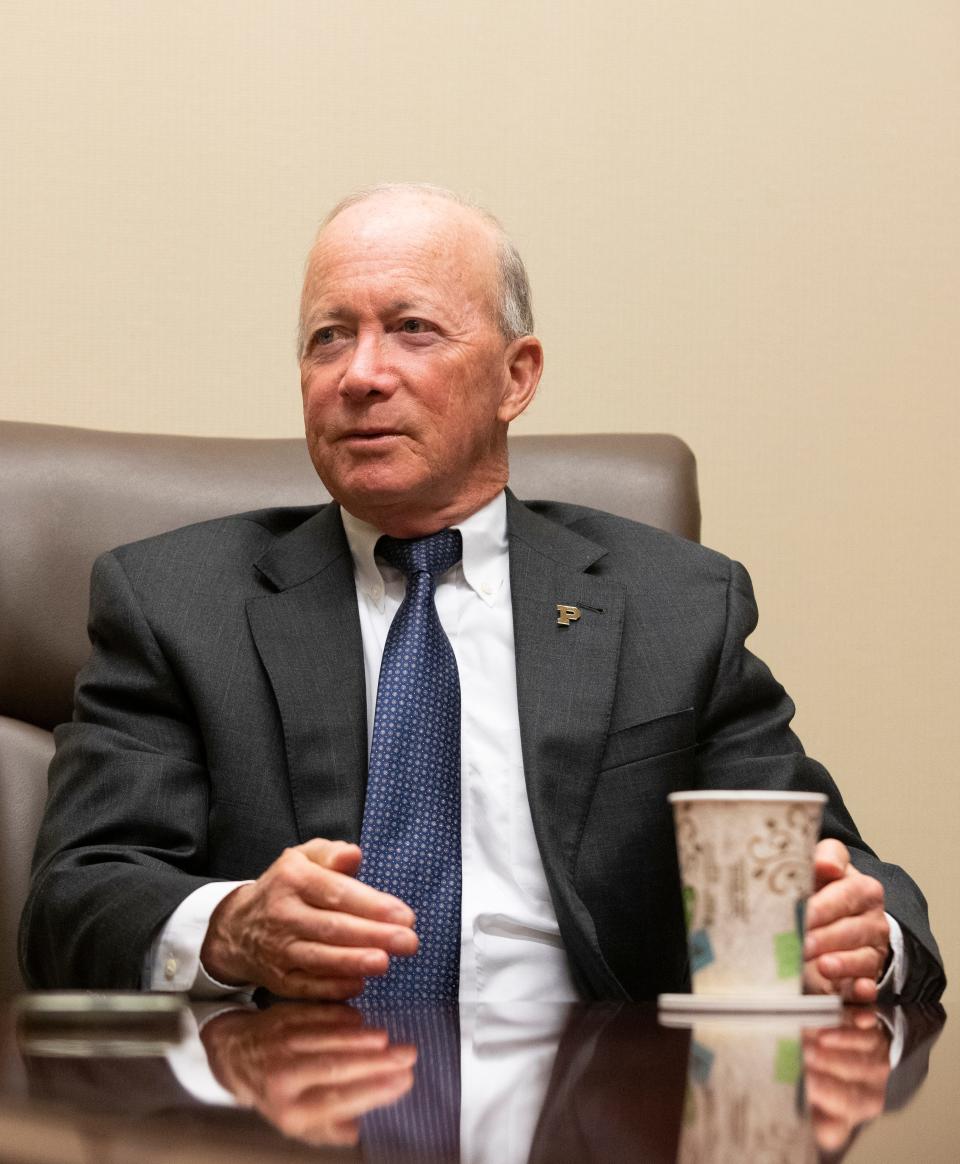Claybourn: Indiana’s GOP primary and the legacy of Mitch Daniels
- Oops!Something went wrong.Please try again later.
- Oops!Something went wrong.Please try again later.
- Oops!Something went wrong.Please try again later.
As voters in Indiana prepare for the gubernatorial primary, the slate of Republican candidates reflects a shift that may mark the end of the Mitch Daniels era — an epoch characterized by pragmatic conservatism and an aversion to the performance politics that now dominates national politics.
The new group of contenders, with their varied tactics and ideological fervor, indicates a party at a crossroads — veering from the restrained conservatism of their predecessors toward potentially more divisive terrains.
Mitch Daniels, inaugurating his gubernatorial tenure in 2005, was renowned for his fiscal discipline and pragmatic governance. His successor Mike Pence, despite facing notable controversy over some social issues, largely focused on fiscal prudence while eschewing the performative politics that have since become prevalent. Eric Holcomb furthered this legacy, prioritizing practical policies over polarization, despite adopting unique approaches.
However, this year's gubernatorial primary presents a departure from this tradition. The current candidates are increasingly adopting performative politics and aligning themselves with the nationalistic and polarizing elements of the party — a pivot that might appeal to the base but threatens to estrange the broader electorate that was once drawn to the measured conservatism of Daniels, Pence, and Holcomb.
Some of this year’s gubernatorial candidates promise to champion conservative values with an uncompromising zeal, while others tout their allegiance to former President Trump, signaling a shift towards a more theatrical political performance.
This move away from Daniels’ ethos reflects the evolving dynamics within the Republican Party, where the litmus test increasingly centers on loyalty to a personality rather than a set of principles.

Mike Braun, transitioning from the U.S. Senate to the gubernatorial race, has consistently underscored his alignment with former President Trump, positioning himself as a staunch defender of Trump's legacy. Braun’s frequent references to Trump not only signal loyalty but also serve to galvanize a base increasingly drawn to such displays of allegiance over nuanced policy debates.
This primary, therefore, is not just a contest for the governorship but a referendum on the identity of the Indiana Republican Party. Will it continue in the pragmatic vein of Mitch Daniels, or will it embrace the tumult of today’s political zeitgeist?
As these candidates vie for the hearts and minds of Indiana’s Republicans, they do more than just campaign for an office; they shape the future contours of their party.
The philosophical grounding of Hoosier politics, where compromise and practical governance were once the norm, seems increasingly sidelined. Today, the spectacle of politics often overshadows substantive policy discussions, with candidates leaning more towards delivering memorable soundbites than laying out detailed, pragmatic governance plans. This transformation in Indiana’s gubernatorial primary is not just a local phenomenon but a microcosm of the larger, existential challenges facing the GOP nationally, as it grapples with its future direction in an ever-evolving political landscape.
This primary not only determines the political leadership in Indiana but also serves as a barometer for the Republican Party's national trajectory.
The stark contrast between the Daniels legacy of pragmatic conservatism and the current trend toward a more sensationalist political ethos reflects a broader ideological battle within the party. This struggle is not confined to the boundaries of Indiana but echoes across states, influencing the GOP's approach towards governance at a national level.
The allure of populism, with its direct appeal to voter emotions and simplicity in messaging, presents a formidable challenge to the traditional conservative values of fiscal restraint and measured policymaking. As candidates in Indiana align themselves with or against this trend, they are effectively testing the waters for the Republican Party's future strategies in upcoming national elections.
The outcome of this primary may signal whether the party leans towards re-embracing its traditional roots or continues down the path of transformation under the influence of populist figures.
Moreover, the evolving dynamics within the Indiana GOP could foretell shifts in voter alignment and party loyalty. As the party's identity shifts, so too might the political landscape of the Midwest, traditionally a battleground for American politics.
The implications of this primary extend far beyond state lines, potentially reshaping the Republican Party's stance on national issues and its strategy for the presidential elections.
This gubernatorial race, therefore, is not just about who will lead Indiana, but about the ideological soul of the Republican Party at large.
Joshua Claybourn is an attorney and author in Evansville. Find him online at JoshuaClaybourn.com.
This article originally appeared on Evansville Courier & Press: Claybourn: Indiana’s GOP primary and the legacy of Mitch Daniels

